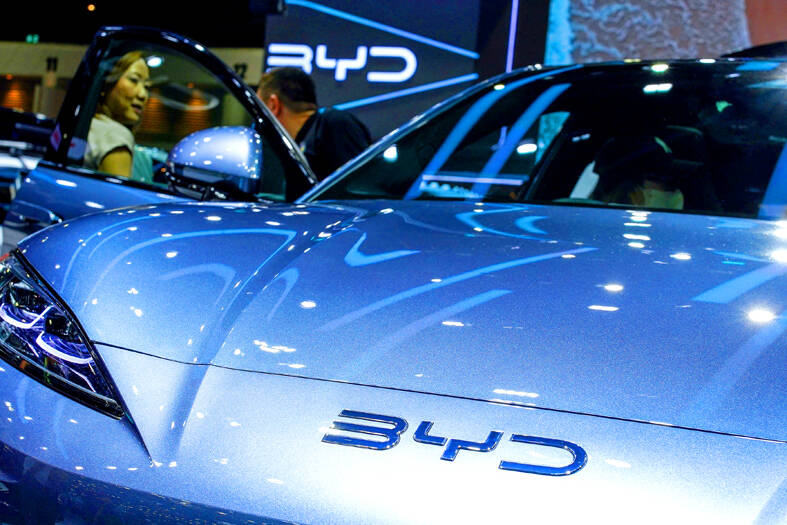Shares in Chinese electric vehicle (EV) giant BYD Co (比亞迪) surged to a record high yesterday after it unveiled new battery technology that it says can charge a vehicle in the same time it takes to fill up a car with gasoline.
The company said the battery and charging system, called “Super e-Platform,” boasted peak speeds of 1,000 kilowatts, allowing cars to travel up to 470km after being plugged in for just five minutes.
The new technology aims to “fundamentally solve users’ charging anxiety,” BYD founder Wang Chuanfu (王傳福) said.

Photo: Reuters
“Our pursuit is to make the charging time of electric vehicles as short as the refueling time of fuel vehicles,” he said at a launch event on Monday evening.
BYD’s Hong Kong-listed shares jumped more than 6 percent to hit a fresh peak at one point yesterday morning before paring some of the gains.
The announcement positions BYD ahead of archrival Tesla Inc, whose Superchargers currently offer charging speeds of 500 kilowatts.
BYD introduced the Super e-Platform alongside two new EV models that are the first to feature the system — the Han L sedan and the Tang L sports utility vehicle.
The Shenzhen-based company also unveiled plans to build more than 4,000 ultra-fast charging stations nationwide to support the new technology.
BYD’s ambitious expansion comes on the heels of remarkable growth, with sales last month soaring 161 percent to more than 318,000 EVs, while Tesla experienced a steep 49 percent sales decline in the Chinese market during the same period.
Separately yesterday, Chinese EV maker Nio Inc (蔚來) said it had signed a deal with battery giant Contemporary Amperex Technology Co (CATL, 寧德時代新) involving cooperation on a passenger car battery swap network.
Battery swapping offers an alternative to ultra-fast charging for vehicle owners worried about range, although the vast infrastructure required and standardization issues present major hurdles.
The new cooperation would see CATL invest a maximum of 2.5 billion yuan (US$346 million) in Nio’s battery swap network.

TAKING STOCK: A Taiwanese cookware firm in Vietnam urged customers to assess inventory or place orders early so shipments can reach the US while tariffs are paused Taiwanese businesses in Vietnam are exploring alternatives after the White House imposed a 46 percent import duty on Vietnamese goods, following US President Donald Trump’s announcement of “reciprocal” tariffs on the US’ trading partners. Lo Shih-liang (羅世良), chairman of Brico Industry Co (裕茂工業), a Taiwanese company that manufactures cast iron cookware and stove components in Vietnam, said that more than 40 percent of his business was tied to the US market, describing the constant US policy shifts as an emotional roller coaster. “I work during the day and stay up all night watching the news. I’ve been following US news until 3am

Six years ago, LVMH’s billionaire CEO Bernard Arnault and US President Donald Trump cut the blue ribbon on a factory in rural Texas that would make designer handbags for Louis Vuitton, one of the world’s best-known luxury brands. However, since the high-profile opening, the factory has faced a host of problems limiting production, 11 former Louis Vuitton employees said. The site has consistently ranked among the worst-performing for Louis Vuitton globally, “significantly” underperforming other facilities, said three former Louis Vuitton workers and a senior industry source, who cited internal rankings shared with staff. The plant’s problems — which have not

TARIFF CONCERNS: The chipmaker cited global uncertainty from US tariffs and a weakening economic outlook, but said its Singapore expansion remains on track Vanguard International Semiconductor Corp (世界先進), a foundry service provider specializing in producing power management and display driver chips, yesterday withdrew its full-year revenue projection of moderate growth for this year, as escalating US tariff tensions raised uncertainty and concern about a potential economic recession. The Hsinchu-based chipmaker in February said revenues this year would grow mildly from last year based on improving supply chain inventory levels and market demand. At the time, it also anticipated gradual quarter revenue growth. However, the US’ sweeping tariff policy has upended the industry’s supply chains and weakened economic prospects for the world economy, it said. “Now

COLLABORATION: Given Taiwan’s key position in global supply chains, the US firm is discussing strategies with local partners and clients to deal with global uncertainties Advanced Micro Devices Inc (AMD) yesterday said it is meeting with local ecosystem partners, including Taiwan Semiconductor Manufacturing Co (TSMC, 台積電), to discuss strategies, including long-term manufacturing, to navigate uncertainties such as US tariffs, as Taiwan occupies an important position in global supply chains. AMD chief executive officer Lisa Su (蘇姿丰) told reporters that Taiwan is an important part of the chip designer’s ecosystem and she is discussing with partners and customers in Taiwan to forge strong collaborations on different areas during this critical period. AMD has just become the first artificial-intelligence (AI) server chip customer of TSMC to utilize its advanced